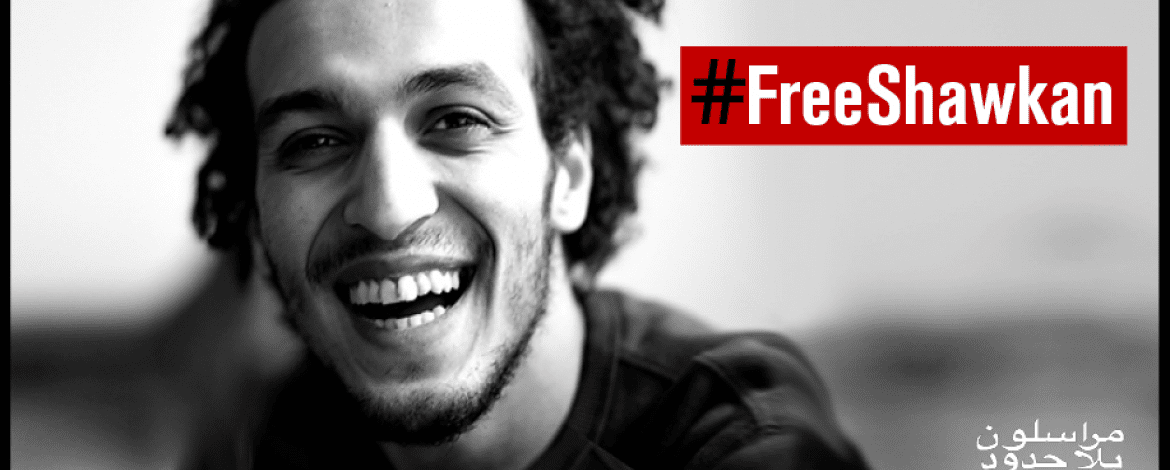Media Defence has filed an update to the UN Working Group on Arbitrary Detention in connection with the ongoing detention of award-winning photojournalist Mahmoud Abou Zeid.
Mahmoud Abou Zeid, known as “Shawkan”, was released on 4 March 2019, after spending more than five and half years in prison on anti-state charges, after he reported on a deadly crackdown on protesters by Egypt’s security forces in 2013.
While Shawkan’s release was initially celebrated, it became apparent that he remained subject to system of “police observation” imposed as part of a five-year probation.
Under this system, Shawkan must report to a Cairo police station at 6pm daily. Whether he spends the night in the cells is at the discretion of the police officer on duty. So far, he has spent every night since his “release” behind bars.
Due to the rush hour traffic in Cairo, Shawkan must leave his home hours before the 6pm deadline to ensure that he arrives on time. As the police holding cell is often over-crowded, he is usually required to sleep on the sidewalk outside, unprotected from the weather. He is released again at 6am.
Shakwan has tried to resume a normal life however suffers under these strict conditions. Despite his determination to resume work, he has not been able to do so. He spends his limited “free” hours resting before preparing to return to the police station.
In our submission to the Working Group, Media Defence highlighted that Egypt’s use of these draconian probation conditions is an attempt to prolong Shawkan’s detention and prevent him from working as a photojournalist.
Egypt’s use of these measures, including against journalists and peaceful activists, has been criticised by international human rights groups. Amnesty International has documented more than 400 cases of individuals currently subjected to overnight probation, despite their release from prison.
Sherif Mansour, of the Committee to Protect Journalists, commented, “The treatment that Shawkan suffers on a daily basis and the limited time he spends out of custody are not the experiences of a free man. The UN Working Group on Arbitrary Detention should acknowledge the reality of his situation and continue to demand that Egypt frees Shawkan once and for all”.
Shawkan continues to attend the police station daily. He has no opportunity to challenge the conditions, which are due to remain in place for five years.
For further information, contact Pádraig Hughes, Legal Director: Padraig.hughes@mediadefence.org
Recent News
Landmark Ruling: Kenya’s High Court Declares Colonial-era Subversion Laws Unconstitutional
Media Defence welcomes the verdict of the High Court in Nakuru, striking down sections of the Kenyan Penal Code which criminalise subversion, citing them as relics of colonial oppression that curtail freedom of expression. Justice Samwel Mohochi, delivering the judgment, asserted that these provisions were overly broad and vague, stifling dissent rather than serving any […]
UN Rapporteurs Call for Protection of Brazilian Journalist Schirlei Alves
UN Rapporteurs Call for Protection of Brazilian Journalist Schirlei Alves Amid Defamation Charges Stemming from Rape Trial Coverage A letter dispatched by UN rapporteurs to the Brazilian Government calls for protective measures for women journalists covering cases of sexual crimes. The letter also denounces the conviction of Brazilian investigative journalist and women’s rights defender, Schirlei […]
Convite à apresentação de candidaturas: Cirurgia de litígio em português na África Subsariana
Cirurgia de litígio em português na África Subsariana Aplique aqui 23 a 25 de julho de 2024 em Nairobi, Quénia Prazo: 3 de maio A Media Defence está a convidar advogados sediados na África Subsariana que falem português a candidatarem-se a participar numa próxima cirurgia de litígio sobre o direito à liberdade de expressão e […]



